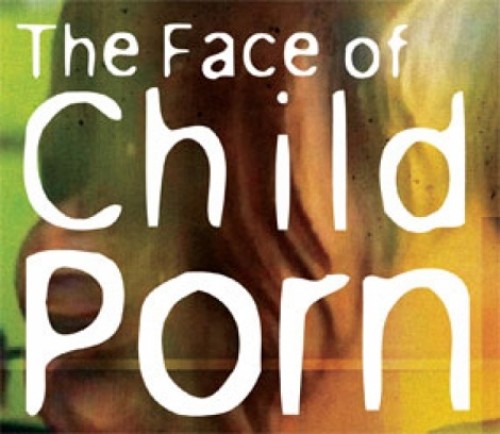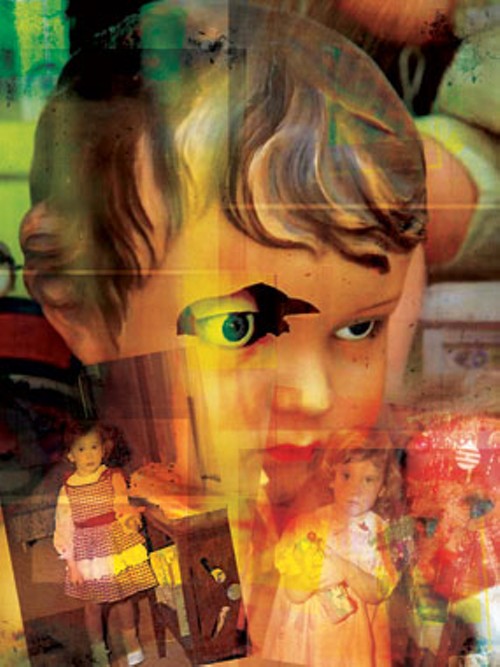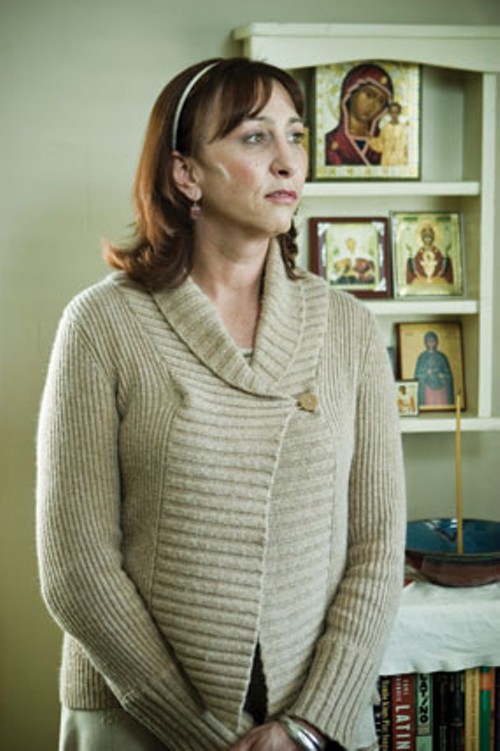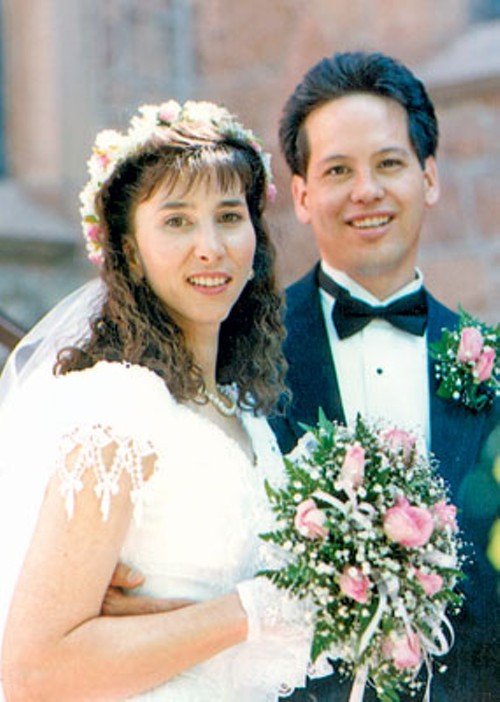Feature | The Face of Child Porn: Gina Zhdilkov thought her family was safe from the child porn that ruined her childhood. Then the FBI investigated her husband.
By Stephen Dark @stephenpdark
One late night in January 1997, Gina Zhdilkov set out from Los Angeles International Airport in a rental car driven by her then-husband, Roger Greer. They were going to slay, as Zhdilkov wrote in a poem afterwards, “a withered, old dragon,” to set his “captive maidens free.”
The dragon was her father, Herbert Becker, who lay unconscious in a hospital bed in Los Angeles. Zhdilkov, then 35 years old, called him a dragon because he hoarded gold coins in drawers throughout his house. A neighbor had found the 82-year-old widower collapsed in the bathroom of his house in Paso Robles in central California. His son had arranged for Becker to be transferred to a hospital near his home.
Becker had molested and raped Zhdilkov, she says, from age 3 to 13. He had told Zhdilkov if her mother ever found out about the abuse, it would kill her. When her mother died of a stroke in 1993, Zhdilkov started to remember details of her abuse. For two years from 1994, she went to therapy in Salt Lake City where she then lived. By the end of 1996, her therapist felt she was coping sufficiently with her post-traumatic stress that she could stop her sessions.
But Zhdilkov had lingering doubts as to whether she was remembering all her father had done to her. In particular, she suspected he had used her to make child porn. With her father’s collapse, she decided it was time for the truth.
Greer and Zhdilkov pulled up in the driveway of the house in the Paso Robles’ retirement community a little after 2 a.m. In the garage, Greer worked on opening a padlocked trunk. Zhdilkov went through the bedroom, rifling through Becker’s sports jackets. For 23 hours straight, they searched the house. All they found were some pornographic stories. Some of the things he wrote about, she remembered him doing to her. Finally, she sat on the edge of the bed.
“I was crazy to come here,” she said to Greer. “We’re not going to find anything.”
Greer insisted on searching Becker’s closet again. “Bingo,” he said and held up a cloth moneybag. He pulled out negatives. “God, Gina, this is sick.”
“That’s my mother,” she said of one negative. “That’s me. I don’t know who that is.” They were horrific images of little girls, of teenagers, and her mother penetrated with bizarre objects. “You don’t want those images in your mind if you don’t have to have them,” Zhdilkov, now 47, says.
For several minutes, she was in shock. Then, it was as if a dam had burst inside her. She screamed again and again in the voice of a 3-year-old child, “He hurt my
mommy.” Greer tried to calm her down, fearing her screams would draw the police. She had to get her father’s blood out of her veins. She flew into the bathroom, desperate to find something to cut open her wrists. Greer forced her to down a large alcoholic drink, and she passed out.Greer and Zhdilkov burned most of the negatives in her father’s fireplace. She took back to her therapist the images of her and items she recalled her father using to abuse her, such as a pair of handcuffs. Through all this, Greer was constantly by her side. Ten years later, though, in 2006, Zhdilkov learned that the very person who helped her recover from her childhood abuse shared some of her father’s aberrant sexual tastes. It was no longer Herbert Becker she had to expel from her veins. Rather it was the man with whom she found love for the first, and, she prophecizes, last time in her life, her third husband, Roger Greer.
In January 2008, 52-year-old Greer began a 33-month stretch in a Seattle federal penitentiary, SeaTac, for the possession of child pornography. He also has to pay a fine of $2,500. Court documents state he had 600-plus still and video images which “consisted predominantly of … naked, lasciviously posed photographs of prepubescent females.” Through a prison spokesperson, Greer declined an interview request.
Zhdilkov, who is half-Jewish, draws a comparison of sorts between what she describes as Greer’s “complete betrayal” of her with child porn and the Holocaust. “It’s like marrying a Holocaust survivor and after the wife goes to bed, he gets on Nazi Websites and collects pictures of the bodies,” she says.
An experienced therapist for sexual-abuse victims, Zhdilkov gives an eloquent definition and depth to the suffering of the voiceless victims of child pornography: the hundreds of thousands of unidentified children whose visually recorded torment floats eternally around the Internet. According to a 2006 congressional record, Salt Lake City FBI agent Juan Becerra says an estimated 3 million images of child pornography are on the Internet. Much of the child porn comes from Southeast Asia and former Eastern Bloc countries. A 2003 U.S. State Department report noted that children were being kidnapped and even purchased from Russian orphanages for sexual abuse and child pornography. Child pornography is big business, generating $20 billion a year. And that’s not including individuals who trade privately with other collectors.
While some make hefty sums from child porn, others have to live with the consequences. Zhdilkov’s life charts the saddest of circles: from a child-porn victim in the 1960s, when her father would, she surmises, sell photographs of her abuse to supplement the family income to that of an unwitting wife of a man who victimized hundreds of children by illegally downloading images of their suffering off the Internet. She also lives with the knowledge that the images her father took and sold of her may well still be in someone’s collection. Her story, for all its horror and undeniable pathos, offers a window into a complex, murky world that the term “kiddie porn” renders all too simple to digest. Porn comes with associations of freedom of choice for adults who perform sexual acts for the camera. There is no freedom in photographs of terrified, naked children, Zhdilkov says.
Rhett McQuiston, captain of Utah’s Attorney General’s Task Force on Internet Crimes Against Children (ICAC), says video clips are highly sought after by child-porn collectors. “One of the most disturbing images I’ve ever seen is a young child being raped by an adult.” Add sound to the image of the child screaming for help and the horror only escalates.
ICAC investigated more than 400 cases in Utah last year alone and sent 70 to the courts. That, McQuiston acknowledges, doesn’t even scratch the surface. “For every one we get, there’s a 1,000 out there we don’t.”
One the FBI got was Greer. His sentencing merited six lines in the Deseret News. But behind that sentencing stand the children and teenagers whom Greer victimized by downloading and hoarding images of their abuse. Zhdilkov wanted to speak at Greer’s sentencing. Someone on the prosecution team told her that, because she wasn’t a victim, it wasn’t possible. “No one was speaking for the victims,” Zhdilkov says. “I went through it as a child. I could at least speak for them.”
Zhdilkov has fought hard to take her life back from her father’s abuse, and now from her ex-husband’s deception. Part of that battle was legally changing her last name in 1994 to Zhdilkov. “I wanted something that was mine,” she says. Zhdilkov was the name of the village her father’s parents came from in Russia. “My grandfather was the safest guy in the whole world,” she says. Pogroms razed the village to the ground almost a century ago. “To this day, there’s nothing there,” she says. “But I survived.”
SNAP HAPPY
Zhdilkov was born in South Central Los Angeles in 1961. Her mother, Mildred “Marie” Becker traced her lineage back to pre-Revolutionary War times. The neighborhood they lived in was predominantly Hispanic. Herbert Becker kept to himself in the detached garage where he spent much of his spare time. “He felt he had the anonymity and privacy he ultimately needed,” Zhdilkov says. “Most of what my dad did was in that garage.” A lonely child, she adored the neighboring Mexican families, particularly watching the mothers cook in their noisy, steam-filled kitchens.
Becker was a machinist and, his daughter says, a loud, hectoring bully. He would take his wife and child down to Tijuana to show them how good they had it. “See how lucky you are,” he’d say as they drove past shantytowns. “He liked to associate with people who were in desperate circumstances,” Zhdilkov recalls, like the motherless girls who lived around the corner in a trailer court. “Looking back, most likely, he abused them.”
Her father molested her at such a young age, she said, “I repressed a lot of memories.” Instead she had nightmares and acted out in
ways that today, she says, would be recognized by professionals as signs of chronic abuse. As she grew older, if memories came to her, “I would push them out so fast it was like having a remote control, click, we’re not doing that station.”When she was 8, her father took her and her mother to an old pond sealed off with barbed wire. It was a secluded area with a rock that resembled a chair. Becker had his daughter take her clothes off. She didn’t want to do it, but her mother was there. “If my mom was there, nothing bad was going to happen,” she felt.
Becker didn’t like her covering herself with her arms. What upsets Zhdilkov about that day even now was that she was smiling in some of the photographs. “I betrayed myself,” she says about those smiles. When she and Greer found Becker’s negatives, there were pictures from that rock session where she wasn’t smiling. “Anyone who could keep looking at that child and keep snapping those pictures was pretty sick,” she says.
Her father had a large-bulb aluminum lamp for lighting his subjects. Whenever she had a pimple, he would drag her under it and invasively examine her. “I always had terrible memories of that lamp,” she says. When she became sexually active in her late teens, “I would have flashbacks during sex when I would feel there is this light being shined on me.” Yet, she never let herself believe that something like that had happened. “One of the sad things about child abuse is that it’s less painful to tell yourself as a child or an adult that you’re crazy, you’re evil, there’s something wrong with you, than to believe your own truth.”
THE MAN OF HER DREAMS
“I can’t stand to look at you anymore,” Becker screamed at 13-year-old Zhdilkov. “I’m going to kill you.”
Her mother screamed as she fought to pull her husband off their daughter. He fell down. “That’s it, I’m done,” he said. He moved into a motel that night and stayed there for eight years.
On Zhdilkov’s 18th birthday, her Hispanic boyfriend proposed to her. They were married in a Catholic Church. The first time she had sex as an adult, she was confused by how familiar it felt. Later, she “blanked out a lot, went elsewhere,” during the act. “Nobody seemed to mind,” she says and laughs. While Zhdilkov laughs often and loud, it’s a sound that teeters constantly on the edge of tears.
Once married, every time her husband came home, she got a knot in her stomach at the prospect of his sexual needs. “People think when the abuse is over, it’s over, but it’s not,” she says. “If you grow up with something so incredibly twisted, you don’t even know you need to heal. You’re wanting to find something better, healthy and you don’t know what better, healthy is.”
The next several years were a picture of instability. Her first marriage lasted 18 months. She moved to Utah to save money but hadn’t bargained on the poor wages and tips she’d earn as a waitress. Pregnant with twins after a short relationship, she found herself living on a food budget of $50 a month in an apartment she couldn’t afford to heat. A neighbor in her duplex offered to help. She ended up marrying him. After graduating with a BA in psychology, she continued on for a Master’s in social work. By then, she and her second husband had split up, after the birth of her third child.
Part of her graduate work included volunteer hours at Salt Lake City’s Rape Crisis Center, now known as the Rape Recovery Center. At the conclusion of her nighttime crisis line shift, which volunteers did at home, a friendly volunteer, Roger Greer, would debrief her and other volunteers by phone, Zhdilkov says. He was known “as a committed advocate to victims and volunteers alike.” After she separated from her second husband, whom she later divorced, Greer called to offer support. In 1993, a romance developed, although Zhdilkov was very cautious. She knew that pedophiles often honed in on single women with young children. “He had to go through this interview process if he was going to be around my kids,” she recalls.
Everyone loved the former Boy Scout leader, from her 8-year-old twin girls and 3-year-old daughter to her picky cat. A former botanist and plant researcher, Greer started working at Salt Lake City-based National Stock Transfer (NST) in the early 1990s. A few years later, Greer bought the company, which handles the transfer of ownership of company stocks, from its then legally embattled owner, David Yeaman, Zhdilkov recalls. According to a Wall Street Journal article in 1997, Yeaman and four associates were convicted of securities fraud involving companies unrelated to NST in a Philadelphia federal court. Greer’s stewardship of NST hasn’t been without its problems, his current jail time excluded. The SEC fined him and a former associate $5,000 for violations of securities registration provisions in 2000.
Before Zhdilkov, then-40 year old Greer, according to his attorney, Jerome Mooney, had never had an adult relationship. “In reality, he should never have got involved with her in the first place,” Mooney says.
That’s a sentiment Zhdilkov undoubtedly now shares. But not back in 1994. Then, for the first time in her life, she felt safe. That sense of security, combined with the death of her mother from a stroke, brought an avalanche of memories of her father’s abuse. Greer went with Zhdilkov to therapy with a local psychologist, Thomas G. Harrison. For the first year, she couldn’t bring herself to look at Harrison. In the voice of a child, she would whisper to Greer to tell Harrison the depravities her father had inflicted upon her.
At first she was terrified she would lose Greer. But each time she said something about her past, Greer would hold her and tell her how sorry he was for what had happened. “I loved him so much, you can’t imagine,” she says.
GHOST MOM
Zhdilkov graduated with her masters degree on June 10, 1994. She married Greer the next day. Her twins sang a wedding song a cappella, and her youngest child was the ring bearer. “It was the most beautiful day of my life,” she says in tears. They bought a fixer-upper on Princeton Avenue, in the 9th and 9th district of Salt Lake City.
For the first time in Zhdilkov’s life, love and sex came together. As she grew psychologically and emotionally healthier, she left behind the damaged child who had turned to Greer for comfort so often. It was then, she says, her husband pulled away. “The problem was he wasn’t comfortable with me anymore,” she says. “I didn’t get it.”
After her discovery of her father’s photographs and his subsequent death a few months later, Zhdilkov struggled to keep her life together. “I was determined my father wasn’t going to reach out from the grave and ruin everything I had worked so hard for, my life with my husband and my daughters. I just wanted to raise this happy family so bad.”
Try as she might, though, the horror of what Greer had found in her father’s closet slowly consumed her. She couldn’t sleep without getting drunk first. She had nightmares, constantly shook, and after a year, had to give up work as a therapist for sexually abused children and their families at Valley Mental Health. She found herself spacing out into nothingness, believing she was nothing more than “nuclear fallout.” Her mother had gone through similar spells where she would abruptly sit in a chair and mentally disappear. “She was all I had, and I would try harder and say, ‘Please let me in, please let me in,’ and she was just like a zombie,” Zhdilkov says.
All Zhdilkov thought she could do to help everybody was “to move on, instead of having this ghost mom who’s there but not really there.” A year after finding the pictures, she tried to kill herself with tranquilizers and alcohol. Instead of stopping her pain from leaking “all over my house and my kids,” her suicide attempt made things “infinitely worse,” she says in a tiny voice.
After a week in a psychiatric institute and treatment for substance abuse, Zhdilkov began the long path to recovery. Her children are now adults, living their separate lives.
THE ENEMY BESIDE YOU
Greer and Zhdilkov separated in September 2003, when, she says, she learned he’d been lying about finances, including taking out numerous substantial loans and failing to file his taxes for five years. A year and a half later, they got back together. On June 29, 2006, Zhdilkov left work to find her husband home uncharacteristically early. “You won’t believe the day I’ve had,” he told her.
The FBI had interrogated him about a Seattle-based business associate being investigated for securities fraud and had carted off computers from his office. The bombshell was yet to come. “You better sit down now because there’s something I need to tell you that may or may not end our marriage,” she recalls him calmly informing her.
During the FBI interview, he had denied having any child porn on his home or work computers. Later that day, he changed his mind. He voluntarily handed over to the FBI four discs of child pornography he had at the office. He told his stunned wife he had downloaded it from the Internet while they were separated because he was depressed.
Zhdilkov drove to one of her daughters’ homes. Her son-in-law told her, “You can’t stay married to him, can you?”
She returned home to find a note on the table from Greer. The FBI had more questions for him. “I should be back in a couple of hours. I sincerely regret the pictures. Love, Roger.”
Her closest friend, special-education teacher in Davis and Salt Lake county schools, Beth Mazur, was driving when her cell phone rang. A voice like a child crying for help called out her name on the phone. Mazur found Zhdilkov in a rocking chair. She said she had thrown Greer out of the house. If Zhdilkov had had a gun that day—as she says she does now—she would have shot him. “This was the enemy in my house, the enemy of everything,” she says. “He had to go at all costs.”
Mazur took Zhdilkov home. All night long Zhdilkov lay in Mazur’s bed with her, sobbing, in the fetal position. “It was like the whole world had broke,” Mazur says.
Zhdilkov believes her ex-husband, whom she divorced after a messy yearlong battle in 2007, from the beginning of their marriage was collecting images of child sexual exploitation. As a social worker, Mazur says, Zhdilkov knew all the signs to look for when it came to identifying a child-porn addict. The problem was, given Greer’s five years of volunteer work at the rape crisis center, so did he. “And he hid them,” Mazur says.
One dark question Zhdilkov and Mazur sought to answer was whether Greer had molested any of their four daughters. For two years Greer picked up Mazur’s pre-adolescent daughter from school, claiming he wanted to protect her from child molesters. All four girls, Zhdilkov says, denied anything took place. While Zhdilkov is convinced Greer is a pedophile, federal court documents state, “Though Mr. Greer does not have a diagnosis of pedophilia, the large quantity [of child-porn images] he possessed seems to contradict any contentions that he did not have a strong interest in this subject matter.” For 10 years after his anticipated release in 2010, Greer will be on the sex offenders’ registry.
For Mooney, it was Greer’s post-separation depression and Zhdilkov’s obsession with child porn that led to his client’s problems. Zhdilkov’s obession created “a self-fulfilling prophecy,” he says.
Such theories drive Zhdilkov to tears. “For somebody who was attracted to what he is attracted to, I can’t believe it wasn’t a thrill for him to hear the stories I told my therapist about what had happened to me,” she says. “How could he hear what he heard and then look at those little girls on the Internet and not be sick?”
WAITING FOR GOD
On October 18, 2007, Greer was finally sentenced for a single count of child pornography possession. Prior to the sentencing, Zhdilkov went to the prosecutor’s office with a box of chocolates. She had written a note with the famous line from Forrest Gump—“Life is like a box of chocolates; you never know what you are going to get.”
When Zhdilkov spoke to the prosecutor later that day, having not attended the sentencing, she was told Federal Judge Paul Cassell had given Greer 33 months, 18 less than the minimum federal prosecutors had asked for. They had agreed to drop one count of child porn receipt after Greer pled guilty to possession, which carries a maximum sentence of 10 years. Zhdilkov fell apart. She called the Rape Recovery Center, desperate for someone to talk to. “I couldn’t even breathe to talk,” she says.
Today, Zhdilkov lives in a small house with a back yard where she plans to plant pumpkins, zucchini squash and tomatoes, boysenberry and lilac bushes. Her only company is a parakeet with a dispiriting lack of birdsong. She doesn’t want to disclose where she works or lives for fear of retaliation from members of Greer’s family.
Greer’s sister, Kay Galster, who is running National Stock Transfer in his absence, refused to comment for this story. Attorney Mooney sees no reason why Greer won’t take control of his company when he’s released. Mooney believes Zhdilkov is “profoundly paranoid.” She mounted a letter-writing campaign to numerous people involved in Greer’s case, attempting to ensure he received the justice she felt he deserved.
How much fight Zhdilkov has left in her now is a matter of her own inner debate. She says, “I’d be happy to go at any time. I’m done. I’ve outlived my expiration date.”
For any of the many thousands of child-porn victims in this country and abroad, ICAC’s McQuiston says, it is next to impossible to put their victimization behind them. “Even if the subject is convicted and sentenced, the images are still out there. There’s no way to ensure 100 percent they are removed. They keep popping up in different people’s collections.”
Zhdilkov says she understands victims who feel “a piece of you has been taken and it’s out there forever. But you’ve still got your soul.”
After Zhdilkov threw Greer out, she found numerous discs around the house that contained, she says, tens of thousands of images of child porn. Attorney Mooney says although he hadn’t reviewed the material Zhdilkov found at home, “we did not believe Greer was the source of it.” ICAC took away five computers and numerous hard drives, lap tops and discs. One image Zhdilkov says she found stuck in her mind. It was labeled, “I love elephants.” A naked girl stands, staring at the camera, surrounded by elephant figurines. The haunted look in the child’s eyes is the same look Zhdilkov sees in a photograph of herself at age 4 standing beside a Christmas tree. The FBI did not identify the little girl.
No clearer indication of the insurmountable problem child pornography poses for law enforcement is that less than 1 percent of children in child porn seized by the FBI are identified through cross-checking available databases. That said, there are still successes. ICAC’s McQuiston says Public Safety Department officer Steve Gamvroulas spent two months tracking down the address of a gas station from a partial name and a high school mascot’s name from images in a video relating to another case. “It’s very tedious work watching those videos over and over again,” McQuiston says. Three minors were identified and rescued, their tormentors put behind bars. “Thanks to Gamvroulas there are three victims who aren’t being raped on a daily basis anymore,” McQuiston says.
An arrest, as Zhdilkov knows, is in a sense only the beginning of the story for the victim, not the end. Caught between the betrayal of the two men she wanted to be loved by most in her life, she cannot say who is better or worse.
“I couldn’t conceive of what forgiveness meant after my father died,” she says. “I wanted an absolute guarantee he was in hell.” One day she found herself on her knees, telling God that Becker was in his hands now. That and her work helped put him behind her. “When I started looking back at the number of clients with abused histories I’d worked with, I’ve surpassed my father in helping more people than he hurt with the knowledge he gave me and that I wouldn’t have learned any other way,” she says. “That’s not a thank you to him. It’s kind of how good triumphs over evil.”
Getting over Greer, however, is another matter. She had so looked forward to growing old with him, talking over their memories.
“There is a big part of me that almost feels like Roger was worse. He saw the pain, he heard the pain, he knew what it was doing,” she says. “I never knew him.”
More by Stephen Dark
-
Call it a Comeback
Long mired in economic depression, Midvale’s Main Street dusts off its small-town charm.
- Sep 20, 2017
-
Love Letters
Correspondence between a young woman at the Topaz internment camp and her beloved sheds light on Trump's America.
- Sep 6, 2017
-
Triggered
Veterans Affairs exists to help vets. So why did the Salt Lake VA appoint an anti-veteran chief?
- Aug 30, 2017
- More »
Latest in Cover Story
Readers also liked…
-
Forget the family pedigree—Robert F. Kennedy Jr should not be the next president of the United States
Trojan Horse
- Jun 21, 2023
-
Women decry harassment and toxic culture at St. George auto dealership
Men at Work
- Oct 11, 2023









